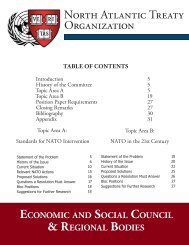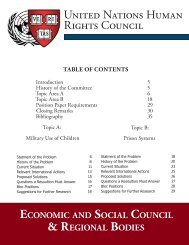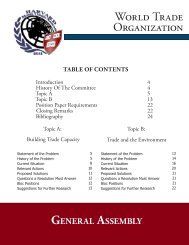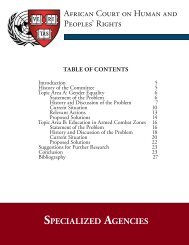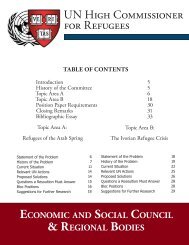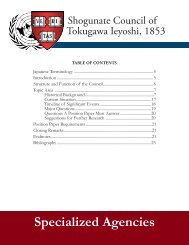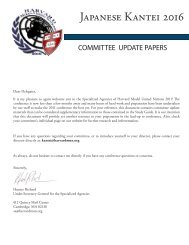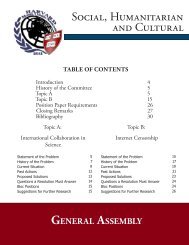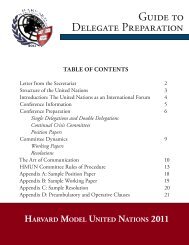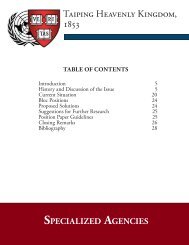Taiping Heavenly Kingdom, 1853 - Harvard Model United Nations
Taiping Heavenly Kingdom, 1853 - Harvard Model United Nations
Taiping Heavenly Kingdom, 1853 - Harvard Model United Nations
You also want an ePaper? Increase the reach of your titles
YUMPU automatically turns print PDFs into web optimized ePapers that Google loves.
<strong>Taiping</strong> <strong>Heavenly</strong> <strong>Kingdom</strong>,<br />
<strong>1853</strong><br />
COMMITTEE UPDATE PAPERS<br />
Dear Delegates,<br />
Welcome once again to the Specialized Agencies at <strong>Harvard</strong> <strong>Model</strong> <strong>United</strong> <strong>Nations</strong> 2012! The conference is now<br />
less than a month away. Our staff has undertaken countless hours of hard work and preparation to make the 2012<br />
conference the best yet. For your reference, this document contains committee update materials, which provides a<br />
valuable supplement to the information contained in the committee Study Guide. We hope that this document will<br />
provide yet another resource for your preparation in the lead-up to conference.<br />
If you have any questions regarding your committee, or to introduce yourself to your director, please contact your<br />
director directly at: taiping@harvardmun.org<br />
As always, do not hesitate to contact me if you have any conference questions or concerns.<br />
Sincerely,<br />
Charlene S. Wong<br />
Under-Secretary-General for the Specialized Agencies<br />
<strong>Harvard</strong> <strong>Model</strong> <strong>United</strong> <strong>Nations</strong> 2012<br />
sa@harvardmun.org<br />
Specialized Agencies<br />
1
<strong>Taiping</strong> <strong>Heavenly</strong> <strong>Kingdom</strong>, <strong>1853</strong><br />
Updates by Michael George, Alexander Quinn,<br />
Elsa Kania, and Francisco Maldonado, Assistant<br />
Directors<br />
The Common Man in Mainland China, 1850s<br />
Popular religion in China is very unrestricted. Most<br />
people are allowed to worship whichever god they<br />
choose as long as it “[does] not challenge the existing<br />
order.” 1 Major religions present in the rural countryside<br />
are Buddhism, Taoism, and polytheistic local beliefs.<br />
Although these people have gods that they pray to, the<br />
philosophy of Confucius is also a significant part of<br />
everyone’s daily life. The <strong>Taiping</strong> people will have to<br />
consider these teachings and their prevalence across the<br />
nation as they continue to bring religious reforms and<br />
bring more people into the fold of Christianity. As the<br />
<strong>Taiping</strong> Army has moved about southern China, it has<br />
destroyed large structures for any gods other than the<br />
Christian God. The <strong>Taiping</strong> movement is in direct conflict<br />
with the popular religion practiced by most of mainland<br />
China. However, the form of Christianity that Hong and<br />
his followers have set out practicing would bring riches to<br />
the poor and thus has become a compelling movement to<br />
follow. The significance of Christianity is that it preaches<br />
a monotheistic religion as well as demonizing Confucius<br />
(in the form of Christianity practiced by Hong). People<br />
are expected to all contribute to the general well-being<br />
of the whole society. Thus, as the rebellion spreads, land<br />
claimed by the <strong>Taiping</strong> is then redistributed equally<br />
amongst the God-Worshippers. Wealth is also confiscated<br />
and put in to the treasury of the <strong>Heavenly</strong> Society. These<br />
direct conflicts with Confucius will be a difficult barrier<br />
to overcome for the <strong>Taiping</strong> movement.<br />
Confucian teachings are widespread and engrained in<br />
to everyday life of the Chinese people. As stated by Fenby,<br />
“Generation after generation has upheld Confucian<br />
teachings, stressing proper human relationships,<br />
between ruler and minister, father and son, superiors<br />
and subordinates, the high and low.” 2 The teachings of<br />
Confucius were responsible for the current position of<br />
women in society. According to Confucian teachings they<br />
are “not allowed to socialize with men outside their family,<br />
and their husbands would not think of introducing them<br />
to acquaintances or mentioning them in conversation.”<br />
Women are not generally not seen as important, because<br />
it is the male line that counts in the heavily ancestrybased<br />
Confucian system. The male line is the one that<br />
carries on the family name and “[carries] out the essential<br />
practice of ancestor worship.” 3 Additionally, a family<br />
bearing only baby girls often would be disappointed<br />
because daughters eventually marry, after which time<br />
they are expected to live with their husband’s family and<br />
take care of their husband’s parents as they grew old. For<br />
this reason, parents would wish for a boy, who would not<br />
only carry on the family name, but also take care of them<br />
in their old age.<br />
Confucian teachings are seen to be a fundamental<br />
aspect of Chinese society, from the common man to the<br />
rulers on high. The bureaucratic exams used to determine<br />
aptitude for government posts are heavily based upon<br />
Confucius and his teachings. These exams are seen as a<br />
way to move up out of poverty and be able to advance<br />
further in to the world. However, less than 1% of people<br />
are able to pass the state level examinations. In addition,<br />
the increased ability of the urban and rural gentry to buy<br />
these positions has led to significant unrest. 4 Confucian<br />
teachings pervaded every aspect of life, but focused on<br />
five main relationships: “Ruler and subject, father and<br />
son, husband and wife, oldest son and younger brothers,<br />
elders and juniors.” 5 These types of relationships are<br />
meant to create a harmonious society, but not necessarily<br />
an egalitarian one. Lower class people are expected to<br />
respect the emperor, and so forth. Thus, the elderly are<br />
well respected in villages and play a significant role in<br />
the family life. Most families and extended families live<br />
together in the same village, and sons are expected to<br />
take care of their fathers. The virtues of these teachings<br />
are tested in the examinations at all levels.<br />
The Hakka people, who were the main instigators<br />
of the <strong>Taiping</strong> rebellion, do not follow these Confucian<br />
teachings as strictly as the majority of China. Hakka<br />
people were seen as outsiders; in the Cantonese dialect<br />
they are referred to as “guest-people.” 6 However, the<br />
Hakka people differ significantly in that their women do<br />
not bind their feet. 7 Bound feet are generally seen as a sign<br />
of attractiveness for Chinese women; however, because<br />
the Hakka women do not have bound feet they are able<br />
to work in the fields alongside the men. The unbound<br />
feet have also led to Hakka women only marrying Hakka<br />
men because other Chinese found the unbound feet<br />
unattractive and not befitting of a woman to be their<br />
wife. Their perceived status as “guest-people” has caused<br />
significant friction in the provinces in which they live. 8<br />
Villages are generally set up in a hierarchical system<br />
that eventually leads back up to the emperor. All of<br />
China is split up in to 18 provinces, 1,300 districts, and<br />
143 departments, with each district having a magistrate<br />
22 Specialized Agencies
to act as enforcer. A magistrate acts as mayor, sheriff,<br />
judge, coroner, tax collector, surveyor, prison governor,<br />
registrar, organizer of imperial examinations and bailiff. 9<br />
This system has led to a large amount of corruption<br />
due to the significant amount of power held by the<br />
singular figure of the district magistrate. The magistrates<br />
are supposed to be “father and mother officers” to the<br />
Chinese people because they had passed the rigorous<br />
Confucian examinations and believed his teachings. 10<br />
However, by the 1850s this is rarely the case. By this time<br />
only about 60% of them have passed the exams, with<br />
almost 20% bribing or paying for their positions. 11 This<br />
has led to magistrates becoming oppressors and making<br />
the common people ripe for revolt against an emperor<br />
and system that was not benefiting them.<br />
The imperial system has also had a large affect on<br />
agriculture. There are restrictions on the transportation<br />
of grain between provinces, to ensure that each province<br />
is able to sustain itself sufficiently. 12 Also, there are<br />
grain storage houses which the magistrates also control,<br />
acting as an overlord to distribute the food to the people.<br />
However, these systems have led to mass famines and<br />
food shortages following floods in the early 1850s. 13<br />
These mass famines then led to spirit of discontent among<br />
the common people, embodied in the Nian Rebellion<br />
(which was simultaneous with, but independent of, the<br />
<strong>Taiping</strong> Rebellion). The Nian Rebellion has had a large<br />
influx of members due to the massive flooding of the<br />
Huang He, and has been emboldened by the promising<br />
beginning of the <strong>Taiping</strong> movement. 14<br />
Foreign Players in the <strong>Taiping</strong> Rebellion<br />
OVERVIEW<br />
The <strong>Taiping</strong> Rebellion has been deeply influenced by<br />
contact with foreign powers. The ideological foundation<br />
for Hong Xiuquan’s movement originated in his contact<br />
with Christianity through Western missionaries, and the<br />
state weakness that has allowed the rebellion to be so<br />
successful was primarily due to military defeat by and<br />
unequal terms of trade with Great Britain, France, and<br />
the <strong>United</strong> States. Perhaps more importantly, in <strong>1853</strong>,<br />
these foreign players stand poised to play a decisive<br />
role in determining the outcome of the rebellion itself.<br />
However, the policies pursued by the revolutionaries,<br />
particularly the prohibition against smoking opium, pose<br />
a threat to these powers’ economic interests and have the<br />
potential to alienate them. At this point in the rebellion,<br />
forging alliances with these dominant players is essential<br />
Specialized Agencies<br />
<strong>Taiping</strong> <strong>Heavenly</strong> <strong>Kingdom</strong>, <strong>1853</strong><br />
for the <strong>Taiping</strong> because the survival and legitimacy of<br />
their government will depend largely on its international<br />
acceptance.<br />
OPIUM TRADE<br />
Although opium had been sold in China since the<br />
7 th century, Great Britain became the leading supplier<br />
of opium in 1773. Other Western nations, including<br />
France and the <strong>United</strong> States, soon became involved<br />
in the opium trade as well. In the early years of trade<br />
with the West, foreign nations were restricted to trade<br />
zones such as that established in Canton (Guangzhou)<br />
in 1832 by the British East Indian Company. 15 This<br />
came to be known as the Canton system. At this time,<br />
trade was strictly controlled by the Manchu government.<br />
Merchant firms selected by the ruling Qing dynasty were<br />
given a monopoly on trade passing through China—in<br />
exchange for paying a substantial fee to the authorities.<br />
In Canton, a particular merchant guild, known as the<br />
cohong, managed trade between China and Westerners,<br />
serving as an intermediary between the Qing government<br />
and the governments of trading partners. 16 Although the<br />
British made efforts to expand trade beyond Canton,<br />
a decree made in 1757 by the Qing emperor declared<br />
that no other ports would be opened to foreign traders,<br />
and regulations were tightened. For example, traders in<br />
Canton were subject to Chinese law, presumed guilty<br />
until proven innocent.<br />
THE OPIUM WAR<br />
Opium proved incredibly lucrative for the British,<br />
financing both imperial ventures in India and the<br />
purchase of the popular Chinese tea. Beginning in the<br />
1790s, however, the Chinese court became increasingly<br />
concerned about the extent of opium use due the<br />
enormous social and economic consequences. At the<br />
time, a million people in China were addicted to opium.<br />
Although the court established a ban on opium imports,<br />
the opium trade continued largely unmolested, both<br />
grown domestically and smuggled into the country.<br />
Advisors to the emperor debated whether to enforce<br />
these prohibitions or to legalize the opium trade, but they<br />
ultimately opted to enforce the preexisting prohibitions<br />
in 1838.<br />
The Opium War originated from this attempt on the<br />
part of the Qings to ban opium, as well as a prevailing<br />
desire on the part of the British to expand trade beyond<br />
Canton to the lucrative markets beyond. Commissioner<br />
Lin Zexu, a midlevel imperial bureaucrat, was sent<br />
to the port of Canton to crack down on the opium<br />
3
<strong>Taiping</strong> <strong>Heavenly</strong> <strong>Kingdom</strong>, <strong>1853</strong><br />
trade, ordering the confiscation of opium supplies in<br />
1839. Around the same time, reports reached Britain of<br />
threats to civilians living in China. 17 The British Foreign<br />
Secretary at the time, Lord Palmerston, saw the seizure<br />
of opium as an act of war against the Crown. 18 Over the<br />
course of the war, the British sent naval and military<br />
expeditions into China, capturing several major cities,<br />
as superior British technology overwhelmed Chinese<br />
forces. The humiliating defeat of the Qing by the <strong>United</strong><br />
<strong>Kingdom</strong> in the First Opium War greatly weakened the<br />
Chinese state. Subsequent to China’s defeat, the terms of<br />
trade between the two countries were renegotiated in a<br />
way unfavorable to China in the Treaty of Nanking.<br />
THE TREATY OF NANKING<br />
The 1842 Treaty of Nanking demanded substantial<br />
concessions from China. Perhaps most importantly,<br />
however, “treaty ports” were established in Canton,<br />
Amoy, Foochow, Ningpo, and Shanghai, opening these<br />
areas fully to unrestrained foreign trade and influence,<br />
including that of missionaries. Shortly thereafter, in<br />
1844, both the <strong>United</strong> States and France signed similar<br />
treaties with China to acquire the right to trade in<br />
these “treaty ports,” a right granted to all three “treaty<br />
powers.” Chinese was also forced to pay an indemnity<br />
to Great Britain and grant the British Hong Kong.<br />
Among the most important consequences of the Treaty<br />
of Nanking was the establishment of the principle of<br />
“extraterritoriality”, allowing for administration of justice<br />
for foreigners in the port cities where they lived under<br />
consular authorities rather than in the local Chinese<br />
legal system. This diminished the authority of the Qing<br />
and contributed to state weakness that allowed for the<br />
<strong>Taiping</strong> Rebellion.<br />
GREAT BRITAIN<br />
In the early 19 th century, Great Britain was the world’s<br />
leading imperial power and had substantial holdings<br />
overseas, notably in India. At the apex of its power and<br />
entering its imperial century, Britain was dominant in<br />
global politics, both economically and militarily, without<br />
a major rival after the defeat of France in the Napoleonic<br />
Wars, and established what is now known as the Pax<br />
Britannica, acting as global policeman. Britain was heavily<br />
involved in Asia as an imperial power, having recently<br />
incorporated Java, Singapore, Malacca, and Burma into<br />
its imperial holdings.<br />
FRANCE<br />
Beginning in the 17 th century, France was heavily<br />
involved as an imperial power in Indochina, particularly<br />
through interventions in Vietnam, and was competing<br />
with Britain for influence on the global stage. In 1664,<br />
the French East India Company was founded to compete<br />
with the British East India Company for trade, and<br />
France also had established several colonies in India<br />
and on the Indian Ocean. However, France had lost<br />
power and a substantial amount of its colonial holdings<br />
through conflict with Great Britain, most recently in the<br />
Napoleonic Wars. At the time of the <strong>Taiping</strong> Rebellion,<br />
however, France was active in building its Second Empire<br />
under Napoleon III, as in the 1830 invasion of Algeria.<br />
UNITED STATES OF AMERICA<br />
Just emerging from the throes of the Civil War, the<br />
<strong>United</strong> States maintained an inward focus, primarily on<br />
domestic issues and the challenges of Reconstruction.<br />
However, the U.S. was beginning to expand economically,<br />
recognizing the importance of trading routes in the East<br />
and increasingly involved in the opium trade. Unlike<br />
France and Great Britain, however, the U.S. had no<br />
colonial holdings in East Asia. However, at the time of<br />
the <strong>Taiping</strong> Rebellion, American interest in Asia was<br />
quickly gaining momentum. In July of <strong>1853</strong>, American<br />
Commodore Matthew Perry arrived in Tokyo Bay,<br />
seeking to establish trade and diplomatic ties that would<br />
open Japan up to the outside world. 19<br />
MISSIONARIES<br />
Large numbers of American missionaries traveled to<br />
China. One missionary, Reverend Issachar Jacox Roberts<br />
proved particularly influential. Having arrived in China<br />
in 1837, he became, in 1844, the first foreigner to live<br />
and operate outside of the restricted areas, opening a<br />
mission in Canton, where he subsequently worked as<br />
a missionary for twenty-two years. 20 He was the only<br />
Western teacher to instruct the <strong>Taiping</strong>’s spiritual leader<br />
in Christianity and was initially called upon to advise<br />
him in spiritual matters before doctrinal differences<br />
proved divisive.<br />
Beginning around <strong>1853</strong>, as reports began to emerge<br />
as to the Christian characteristics of the insurgents,<br />
missionaries almost immediately took notice and sought<br />
to establish relations with their fellow Christians. 21<br />
Through the linkage provided by Western missionaries<br />
came the potential for foreign support of the rebels<br />
due to the growing frustration of Western officials with<br />
the behavior of the Manchu in failing to fully observe<br />
44 Specialized Agencies
previous treaties with regard<br />
to the opening of trade. Due<br />
in part to the insurgents’<br />
Christian-derived religious<br />
beliefs, American and British<br />
hoped that the <strong>Taiping</strong> might<br />
be more cooperative with<br />
their aims. 22<br />
<strong>Taiping</strong> <strong>Heavenly</strong> <strong>Kingdom</strong>, <strong>1853</strong><br />
The Qing Dynasty<br />
No report on the<br />
<strong>Taiping</strong> Rebellion would be<br />
complete without an analysis<br />
of the Qing Dynasty. This<br />
update paper continues an<br />
elaboration on the Qing<br />
culture, government, and<br />
military from the beginning<br />
of the dynasty, but specifically<br />
in relation to the climate of<br />
the 1850s when the <strong>Taiping</strong><br />
Rebellion began.<br />
CULTURE OF THE QING<br />
The Qing represented a vastly different culture from<br />
that of the previous dynasty, which largely represented<br />
the Han Chinese ethnic group. As ethnic Manchus who<br />
invaded from their stronghold in the Northeast, the Qing<br />
were thus faced with the unenviable task of governing a<br />
substantially large region whose culture was significantly<br />
different from their own. The crucial task at hand was<br />
how to balance the adoption of some Chinese cultural<br />
characteristics so that their leadership would be accepted<br />
by the Chinese themselves, while simultaneously<br />
remaining ‘Manchu’ in identity and without losing their<br />
own culture. The Manchus defined themselves primarily<br />
on the skills and values they associated with their skilled<br />
horsemanship and archery, as opposed to the books-andletters<br />
culture of Chinese Confucianism. 23 Their religion,<br />
a form of Shamanism, was also profoundly different.<br />
The Qing believed that shaman could pass between the<br />
human world and the world of the supernatural through<br />
spiritual death and rebirth, and could thus influence<br />
world events. 24 The Qing also patronized the form of<br />
Buddhism overseen by the Dalai Lama in Lhasa, Tibet,<br />
in order to control Mongol tribes that had converted<br />
to Buddhism. Qing emperors were thus well known for<br />
building Buddhist temples throughout China as a sign<br />
of this devotion. By also patronizing Buddhism, the<br />
Foreign powers did not hold the standing armies of the Qing dynasty in high esteem. Soldiers used<br />
antiquated weaponry, while units were slovenly and ill-disciplined. The dynasty’s military weakness<br />
put it at a disadvantage in treaty negotiations.<br />
Qing dynasty also successfully linked themselves to an<br />
important Chinese religious tradition, as some Chinese<br />
had adopted the religion from India hundreds of years<br />
earlier. 25 Despite these connections, however, the Manchu<br />
sought to preserve their culture as much as possible. The<br />
Qing government issued stringent separation orders,<br />
such as a ban on Manchu women from binding their<br />
feet, as was Chinese custom, and in edicts prohibiting<br />
intermarriage or joint enterprises of any sort. Manchuria,<br />
the Manchu homeland, was declared off-limits to any<br />
Chinese in order to keep it pure. The Manchus similarly<br />
commanded Chinese men to adopt the Manhu hairstyle<br />
known as the queue as a symbolic representation of<br />
their subjugation. 26 The Manchu Emperor Kanxi, often<br />
regarded as the Greatest of the Dynasty, was a role model<br />
in the promotion of Manchu identity, as exemplified<br />
by his periodic hunting trips north of the Great Wall, a<br />
staple of Manchu culture. Kanxi also successfully led the<br />
final rout of all Ming Resistance fighters in 1683. 27<br />
THE QING GOVERNMENT<br />
Ultimately, however, in order to rule, the Qing<br />
government did assimilate by adopting a variety of<br />
Chinese cultural and political traditions, such as filial<br />
piety and reverence for ancestors, the accepted body of<br />
magnificent state ritual, and, perhaps most importantly,<br />
China’s characteristic Confucian-based civil service<br />
examination system. In this regard, the Qing copied the<br />
Specialized Agencies<br />
5
<strong>Taiping</strong> <strong>Heavenly</strong> <strong>Kingdom</strong>, <strong>1853</strong><br />
broad outlines of the earlier Ming Dynasty’s governmental<br />
administration. As the Manchu were a clear minority in<br />
China, the Qing government had to woo the Chinese<br />
into their ranks in order to successfully govern. The Kanxi<br />
emperor, for example, explicitly issued an edict saying<br />
that both Han and Manchu were equal in their abilities<br />
as civil servants. 28 As such, by adopting Ming Dynasty<br />
governmental systems, the Qing successfully pacified the<br />
Chinese population. 29 Despite the overwhelming and<br />
clear numerical majority of the Han Chinese, however,<br />
positions in the government were essentially evenly split<br />
between Manchu and Chinese officials, as Manchus got<br />
preferential treatment in the examination system and in<br />
appointments. In general, Chinese leaders were overseen<br />
by Manchus—for example, while Chinese officials might<br />
be allowed to oversee a province, a Manchu leader would<br />
generally oversee a collection of provinces. Nonetheless,<br />
government itself was minimal, as was the standard of<br />
the day, and in local areas the ‘government’ was barely in<br />
control, depending upon alliances with local gentry to<br />
enforce any regulations or tax collection policy. 30 It is in this<br />
climate that the Xianfeng Emperor, inaugurated in 1850,<br />
served. Xianfeng, who was in power when the <strong>Taiping</strong><br />
Rebellion broke out, was facing a variety of challenges<br />
to his rule, particularly those posed by rebellion across<br />
the empire, and by threats from increasingly assertive<br />
foreign powers. 31 Among his first acts as Emperor was his<br />
dismissal of Mujangga, a Manchu Chief Concilor who<br />
had favored deference and conciliation in dealings with<br />
the West in order to avoid military conflict. 32 While this<br />
did successfully avoid open war, China had been forced<br />
to accept increasingly damaging treaty terms as a result<br />
of the Opium Wars, and the increasing desire of foreign<br />
powers to open up China to trade.<br />
THE QING MILITARY<br />
The Qing Military was severely outranked by foreign<br />
powers, a factor in their weakness compounded by<br />
corruption and decentralization. Since the beginning<br />
of the Qing dynasty, the Qing military was organized<br />
into so-called ‘banners,’ named as such for the particular<br />
colored flags which marked each unit, formed of Manchu<br />
warriors. The Qing also controlled an “Army of the<br />
Green Standard,” originally formed out of the remnants<br />
of defeated Ming forces, but essentially a much larger<br />
Chinese constabulary force that was assigned to garrison<br />
posts throughout China. While civil officials controlled<br />
the Green Standard, military governors controlled the<br />
Manchu banners, who also kept the Green Standard in<br />
check. Although this was at first a strong system which<br />
led to the complete defeat of the Ming dynasty, by the<br />
mid-1700s corruption and poor morale had already<br />
begun to weaken the Banners. By the mid-1800s, it was<br />
clear that the Qing military could not hold a candle<br />
to foreign armies, with their steam-powered transport<br />
and self-firing rifles. In terms of technology, the most<br />
advanced Qing forces had ‘matchlocks,’ or guns which<br />
had to be ignited by hand, while most troops simply held<br />
knives, swords or clubs. 33 The extreme difference in power<br />
between Qing and foreign forces meant that the dynasty<br />
adopted a policy of avoiding military conflict, leading to<br />
the formation of an unequal treaty system stacked against<br />
Chinese interests. 34 This status quo formed despite the<br />
fact that ordinary Chinese, and Chinese leaders in the<br />
government, wanted more resistance to foreign threats.<br />
By the time the <strong>Taiping</strong> Rebellion began in 1850, the<br />
Qing military was clearly in disarray and unable to<br />
manage yet another threat. As such, the Qing dynasty<br />
under the Xianfeng Emperor modified its military<br />
strategy. Firstly, to protect the villages, ordinary civilians<br />
were trained and armed in village-level units overseen by<br />
local gentry, who were in charge of financing, recruiting<br />
and enlarging these forces. While there was a danger in<br />
empowering and arming ordinary civilians, the lack of<br />
any other option made it necessary. 35 These local militias<br />
were eventually transformed into quasi-regular contract<br />
troops upon which the Dynasty was heavily dependent. In<br />
1852, the Xianfeng Emperor put military commissioners<br />
in charge of bringing together these gentry-led local<br />
militias into larger federations. 36 The largest of these was<br />
the Hunan Army, led by the most important military<br />
leader of the day, Zeng Guofan. 37 The creation of these<br />
delegated, local-level armies was an implicit admission<br />
that the Banner and Green Standard Forces had failed<br />
to suppress the rebellions and showed the weakness of<br />
the Manchu military. Furthermore, the fact that Zeng<br />
Guofan and his forces were Chinese meant that the Qing<br />
were conceding Manchu influence, a permanent effect<br />
which would seriously weaken Manchu influence on the<br />
military. Despite this, the Hunan Army, along with other<br />
localized troops, were put in a much better position to<br />
address the <strong>Taiping</strong> Rebellion than the previous Green<br />
Standard and Banner forces. 38<br />
66 Specialized Agencies
Character Biographies<br />
HONG XIUQUAN, DIRECTOR<br />
Born on January 1, 1814, in the Fuyuanshui<br />
Village, Hua County, Guangdong province, China,<br />
Hong Xiuquan was the youngest son of a poor Hakka<br />
family. Since childhood, Hong showed signs of great<br />
intelligence. At around the age of fifteen his parents were<br />
no longer able to afford his schooling, so he became a<br />
tutor to other children in his village and continued to<br />
study privately. His family had hopes that he would<br />
eventually pass the Imperial examination test used to<br />
enter the government bureaucracy. Even though he<br />
scored first in the preliminary examinations, he later<br />
took the first-degree examination for the first time at age<br />
22 and failed. He took the test four more times without<br />
success. Unable to work as a government official, Hong<br />
became an instructor at the Book Chamber House and<br />
several schools in Lianhuatang and other villages.<br />
During one his trips to take the examination, Hong<br />
encountered a Christian missionary preaching about the<br />
religion. There he received translations and summaries<br />
of the Bible written by the Christian missionary Liang<br />
Fa. After failing the test once more and suffering from<br />
a nervous collapse, Hong had several mystical visions.<br />
Seven years later, he associated these visions to the<br />
writings of Liang Fa, and interpreted them as messages<br />
from God giving him the task of ridding the world of<br />
demon worship. He then got rid of all his Confucian<br />
and Buddhist statues and books, and began to preach to<br />
his community about his visions. He followed to destroy<br />
other such icons around his town, activities deemed<br />
sacrilegious, and had to flee his town with one of his<br />
early followers Feng Yunshan in 1844.<br />
They went to the west to Guangxi, where the large<br />
Hakka population was much more willing to receive<br />
his teachings. The Hakka minority proved to accept his<br />
preaching more readily. After studying the Old Testament,<br />
preaching, developing his revolutionary theories<br />
and writing them, Hong returned to Guangxi where<br />
found that Feng Yunshan had gained a mass of around<br />
2,000 converts. This number was raised to somewhere<br />
between 15,000 and 30,000 by 1850. Alarmed by their<br />
amount, the authorities ordered them to be dispersed<br />
unsuccessfully and subsequently declared war with the<br />
group. Hong declared the foundation of the “<strong>Heavenly</strong><br />
<strong>Kingdom</strong> of Transcendent Peace” on 11 January 1851,<br />
proclaiming himself as the <strong>Heavenly</strong> King of Great Peace.<br />
After capturing the city of Yongan and facing difficulties<br />
Specialized Agencies<br />
<strong>Taiping</strong> <strong>Heavenly</strong> <strong>Kingdom</strong>, <strong>1853</strong><br />
laying siege to other cities, in March <strong>1853</strong> Hong’s forces<br />
managed to take Nanjing and turned it into the capital<br />
of their movement where Hong rules from his <strong>Heavenly</strong><br />
Palace.<br />
YANG XIUQING, COMMANDER IN CHIEF,<br />
MOUTHPIECE OF GOD<br />
Yang Xiuqing was born in Xincun village,<br />
Guangxi Province, China, around 1817. Orphaned at an<br />
early age, he became a firewood seller. After experiencing<br />
visions of God, he converted to Christianity in 1848,<br />
joined the <strong>Taiping</strong> band shortly before the start of the<br />
rebellion, and quickly rose to a high position. Yang<br />
claimed that because of trances in which the power of<br />
God moved through him, he had acquired the power to<br />
heal true believers. These powers helped him gain many<br />
supporters, but also a number of enemies. Because of this,<br />
Yang developed an extensive network of eyes and ears<br />
within the <strong>Taiping</strong> ranks that allowed him to rapidly root<br />
out any sources of discontent. In 1851, Yang was made<br />
commander-in-chief of the army and further on named<br />
“East King,” along with three other leaders of the rebellion<br />
who were given titles as “kings” of the four quarters of<br />
the <strong>Heavenly</strong> <strong>Kingdom</strong>. His escape from the imperial<br />
siege of Yongan on April 1852, and his performances<br />
at Yuezhou on December 1852, Wuchang on January<br />
<strong>1853</strong>, and Nanjing on March <strong>1853</strong> contributed toward<br />
his reputation as the <strong>Taiping</strong> Rebellion’s most skillful<br />
tactician and most talented field commander. As a<br />
religious leader, however, his tolerance of Confucianism<br />
and certain symbolic elements of traditional Chinese<br />
religion have caused friction with the all-condemning<br />
policies of Hong Xiuquan.<br />
XIAO CHAOGUI, MOUTHPIECE OF JESUS<br />
CHRIST<br />
Xiao Chaogui was a Hakka peasant devoted to the<br />
new religion of Hong Xiuquan. He is Hong’s brotherin-law<br />
and, during trances, channels the voice and spirit<br />
of Jesus Christ, advising Hong on religious and civic<br />
policy. Along with Yang, he played a major role in early<br />
stages of the rebellion, gaining many supporters through<br />
demonstrations of his supernatural abilities and leading<br />
the troops to victory after victory. As such Xiao quickly<br />
became a powerful and respected figure of the movement<br />
and in 1851, he was made the West King. In this same<br />
year he was severely wounded in a battle in Yongan. After<br />
a long recovery period he has been given different military<br />
assignments, awarded additional noble titles, and now<br />
commands several campaigns.<br />
7
<strong>Taiping</strong> <strong>Heavenly</strong> <strong>Kingdom</strong>, <strong>1853</strong><br />
WEI CHANGHUI, MINISTER OF COMMERCE<br />
Wei Changhui was born in 1823 into a powerful<br />
clan that controlled the market town named Jiantin in<br />
Guangxi. In the early days of the <strong>Taiping</strong> Movement, he<br />
was converted to Christianity by Feng Yunshan and Hong<br />
Xiuquan. His town of origin then became a haven for the<br />
<strong>Taiping</strong> followers, or “God Worshipers.” Because of his<br />
invaluable assistance during the Thistle Mountain days<br />
of the movement, Wei became a leader of the <strong>Taiping</strong><br />
and was then named the North King of the <strong>Heavenly</strong><br />
<strong>Kingdom</strong>. Constantly overshadowed by the more<br />
powerful kings of the East and West (whose prophetic<br />
abilities have earned them considerable influence over<br />
both Hong and the ranks of <strong>Taiping</strong> believers), Wei has<br />
become increasingly at odds with his peers, especially the<br />
seemingly omnipotent Yang Xiuqing, and the two take<br />
every opportunity to interfere in the other’s advancement.<br />
FENG YUNSHAN, MINISTER OF RELIGION<br />
(LEADER OF THE GOD WORSHIPPERS)<br />
Born in 1815, Feng was a neighbor, schoolmate, and<br />
close friend of Hong Xiuquan. He has followed Hong’s<br />
preaching since the earliest days and was the founder<br />
of the “God Worshipers” sect during the 1840’s. After<br />
fleeing their hometown, Feng and Hong embarked<br />
on a preaching mission into the neighboring province<br />
of Guangxi. There Feng founded and organized the<br />
Baishangdi Hui, or “God Worshippers’ Society” which<br />
combined Hong’s religious ideas with community-based<br />
social reform. The thousands of assembled believers that<br />
resulted gave rise to the first members of the <strong>Taiping</strong><br />
Rebellion. When Hong proclaimed his <strong>Heavenly</strong><br />
<strong>Kingdom</strong> of Great Peace in 1851, Feng was given the<br />
named Nanwang, or “Southern King,” and was made the<br />
general of the advance guard. In 1852, as the <strong>Taiping</strong><br />
marched by the city of Quanzhou, Feng was seriously<br />
wounded, but has since begun to recover and reclaim his<br />
role at the helm of the God-Worshippers.<br />
SHI DAKAI, MINISTER OF THE TREASURY<br />
Shi Dakai was born in 1831 in Guigang, Guangxi,<br />
into a moderately wealthy peasant family, of half-Hakka<br />
and half-Zhuang parentage. Because he was orphaned, he<br />
became the head of his family at a young age. Despite his<br />
qualifications, he did not take the imperial examinations<br />
due to his critiques of the corrupt Qing dynasty. In 1849,<br />
still a teenager, Hong and Feng sought him to join the<br />
<strong>Taiping</strong> among the other five original leaders, where his<br />
brilliant tactics, skilled command of the troops, and fair<br />
administration of the public funds (“The Holy Treasury”)<br />
quickly gained him recognition. He was promptly made<br />
commander of his own army. Shi has won wide admiration<br />
for his gentle rule and fair administration. Many have<br />
joined the rebellion attracted by his reputation, and when<br />
the <strong>Kingdom</strong> was proclaimed, he was assigned the title<br />
of Wing King and Lord of Five Thousand Years. Shi was<br />
amongst the leaders of crucial importance to winning the<br />
city of Nanjing, victorious in every battle to win the city.<br />
LI XIUCHENG, MINISTER OF AGRICULTURE<br />
Li Xiucheng was raised as farm worker before he<br />
joined the <strong>Taiping</strong>. He became an eminent military leader<br />
of the <strong>Taiping</strong> Rebellion as of 1851 as the forces headed<br />
toward Yongan and rose quickly through the ranks<br />
because of his natural brilliance as a military commander<br />
in their campaigns in west and central China. Li became<br />
known as the Loyal King because a Qing general<br />
attempted to bribe him to kill Hong Xiuquan, but he<br />
refused. As a loyal server of Hong, he has led <strong>Taiping</strong><br />
forces to many military victories, gaining the respect of<br />
locals and foreigners.<br />
HONG RENGAN, PRIME MINISTER<br />
Born on February 18, 1822, in Huaxian, Guangdong<br />
province, China, Hong Rengan is the cousin and<br />
former neighbor of Hong Xiuquan. When the rebellion<br />
started, Rengan initially fled to the British settlement<br />
of Hong Kong, where he was converted to Christianity<br />
and educated by the Protestant Swedish missionary,<br />
Theodore Hamberg. During this time, he also served as<br />
an assistant to a noted Scottish sinologist, James Legge,<br />
translating Chinese classics into English. During this<br />
time Rengan acquired great knowledge about Western<br />
politics, economics, history, geography, astronomy and<br />
other sciences. Because of his knowledge, he is promptly<br />
made second in chief when he joins the <strong>Taiping</strong> Rebellion.<br />
Rengan serves as the equivalent of a Prime Minister,<br />
taking the title of Prince Gan. As part of the <strong>Taiping</strong>, he<br />
is known for his reforms to the <strong>Kingdom</strong>, which tried<br />
to introduce such Western ideas as railroads, telegraphs,<br />
modern banks, and hospitals.<br />
TANG ZHENGZAI, COMMANDER OF THE NAVY<br />
Tang Zhengzai was born in 1816 in Xian de Qiyang<br />
Hunan. He was the main navy leader of the <strong>Taiping</strong><br />
Rebellion, known as the King of Sail. He led the <strong>Taiping</strong><br />
fleet in many battles, nearly destroying the Xiang Army.<br />
In <strong>1853</strong>, during the battle to occupy Nanjing, Tang<br />
commanded the first offensive, successfully cutting off<br />
every river pass that could reinforce Nanjing, a crucial<br />
88 Specialized Agencies
move to the <strong>Taiping</strong>’s victory. He has since trained other<br />
naval officers, including Li Ronfar and Li Xiucheng.<br />
LI SHIXIAN, MINISTER OF JUSTICE<br />
Li Shixian was born in 1834 in the Guangxi province.<br />
He was the cousin of military leader Li Xiucheng and is<br />
known for his formidable height. Li is a very distinguished<br />
military leader of the late Rebellion. He serves as a Field<br />
Marshal in battles in the Eastern and Western front. Li<br />
received the honorary title of King of Shi “Servant Prince”<br />
for his military work. A pupil and benefactor of some<br />
of the most prominent scholars of the era, Li was also<br />
appointed the minister of justice.<br />
LAI WENGUANG, AMBASSADOR TO BRITAIN<br />
Lai Wenguang was born in 1827 in Meizhou,<br />
Guangdong. He then moved to Guangxi to work. Lai<br />
is Hong Xiuquan’s wife’s younger brother, therefore<br />
Hong’s brother-in-law. His older brother Lai Hanying is<br />
also part of the <strong>Taiping</strong> Rebellion. He joined the <strong>Taiping</strong><br />
group around 1851 and later became a military leader.<br />
Currently, Lai serves as messenger between Hong and<br />
the British representative Sir George Bonham and his<br />
interpreter, Meadows. He holds the position of Colonel<br />
General and was named the King of Zun, or “belief<br />
in God”. Lai has led <strong>Taiping</strong> forces to many military<br />
victories and attracted many northern Chinese to join<br />
the <strong>Taiping</strong> in fighting against the Qing government.<br />
HONG XUAN JIAO, COMMANDER OF THE<br />
FEMALE FORCES AND MINISTER OF FEMALE<br />
AFFAIRS<br />
The younger sister of Hong Xiuquan and the<br />
wife of Xiao Chaogui, Hong Xuan Jiao is currently the<br />
commander of the <strong>Taiping</strong> female regiments. Enraged by<br />
the death of loved ones, Hong Xuan Jiao rose through<br />
the ranks with the benefit of family connections to<br />
her current prominent status. Because of the close<br />
ties between <strong>Taiping</strong> military and civic culture, Hong<br />
Xuan Jiao also presides over female affairs in general,<br />
promoting <strong>Taiping</strong> cultural regulations and managing<br />
the administrative logistics of the female housing areas of<br />
the <strong>Heavenly</strong> Capital.<br />
CHEN YUCHENG, MINISTER OF LOGISTICS<br />
AND LABOR<br />
Chen Yucheng was born in 1834 in Guangxi to a<br />
peasant family. Chen is the nephew of a senior <strong>Taiping</strong><br />
veteran. He joined the <strong>Taiping</strong> rebel forces at a young<br />
age during the march to the Yangtze in 1851. Chen was<br />
nicknamed “The Four Eyes Dog” because he had two<br />
Specialized Agencies<br />
<strong>Taiping</strong> <strong>Heavenly</strong> <strong>Kingdom</strong>, <strong>1853</strong><br />
prominent moles below his eyes. It has been said that<br />
these scare his opponents in battle. Because of his bravery,<br />
Chen has quickly risen in rank to general and now serves<br />
under the title of “Ying (Heroic) Prince”, and because of<br />
his tactical and logistical skills, he has been appointed the<br />
minister of logistics and labor.<br />
HONG TIANGUI FU, MINISTER OF EDUCATION<br />
Born around 1849, Hong Tiang Fu is the son of<br />
Hong Xiuquan. In the <strong>Kingdom</strong> he holds the position of<br />
<strong>Heavenly</strong> Prince, heir of the <strong>Heavenly</strong> King and therefore<br />
holder of divine status. Despite his status as the most<br />
logical successor to the throne of the <strong>Heavenly</strong> King,<br />
Hong Tiangui Fu has shown more interest in academics<br />
than military matters, preferring the book to the sword.<br />
His place of privilege, justified by birth and devoid of<br />
proven credentials, has caused resentment and distrust<br />
from the four kings, but Hong Tiangui Fu continues to<br />
be supported by members of the Hong clan intent on<br />
keeping power within the family.<br />
LUO DAGANG, MINISTER OF INTELLIGENCE<br />
AND AMBASSADOR TO PIRATES<br />
Luo Dagang had been a major secret society leader<br />
and a notorious pirate before becoming a sincere “God<br />
Worshipper.” After enlisting with the <strong>Taiping</strong>, he played a<br />
crucial role in seizing the city of Jiangkou and refurbishing<br />
<strong>Taiping</strong> forces in 1851. From this time onward, Luo<br />
became one of Hong’s key advisors, bringing the <strong>Taiping</strong><br />
crucial skills in the command and execution of waterborne<br />
campaigning, navigation, and supply. In addition<br />
to these skills, Luo’s contacts within the secret society and<br />
pirate networks have proved invaluable to the <strong>Taiping</strong><br />
cause, earning Luo the role of minister of intelligence<br />
and ambassador to pirates.<br />
QIN RIGANG, AMBASSADOR TO FRANCE<br />
Qin Rigang was born in 1821 to a Hakka family. He<br />
became a military leader of the <strong>Taiping</strong> Rebellion, known<br />
during his military tenure as the King of Yen or Yan King.<br />
He served under Hong Xiuquan’s administration and<br />
led the <strong>Taiping</strong> forces to many military victories. Qin<br />
trained and taught Chen Yucheng and Li Xiucheng. In<br />
<strong>1853</strong> he led the siege of the city of Nanjing, proclaimed<br />
the capital of the <strong>Kingdom</strong>, along with Yang Xiuqing.<br />
This same year, Qin met the French representative De<br />
Bourboulon in this city to discuss the <strong>Kingdom</strong> and the<br />
interests and participation of the French in the Rebellion.<br />
TAN SHUNTIAN, SENIOR ADVISOR TO THE<br />
9
<strong>Taiping</strong> <strong>Heavenly</strong> <strong>Kingdom</strong>, <strong>1853</strong><br />
KING, CHIEF OF STAFF<br />
Tan Shuntian became an early follower of Hong.<br />
He experienced firsthand one of Xiao’s trances through<br />
which he was able to speak with Jesus. Later he became<br />
one of the <strong>Heavenly</strong> King’s senior officers, serving in<br />
a capacity similar to the modern notion of a chief of<br />
staff (mediating between the <strong>Heavenly</strong> King and the<br />
various other <strong>Taiping</strong> leaders directing the administrative<br />
responsibilities of the <strong>Heavenly</strong> Capital, etc).<br />
YUNG WING, AMBASSADOR TO THE UNITED<br />
STATES OF AMERICA<br />
Born in 1828 in Zhuhai, in the Guangdong province,<br />
Yung was trained in one of Robert Morrison’s missionary<br />
schools. Upon graduation Yung was sponsored by<br />
Samuel Robins Brown, a missionary in China, to attend<br />
Yale College (Class of 1854) as one of the first Chinese<br />
students to study in the <strong>United</strong> States. Yung Wing was<br />
naturalized as an American citizen on 1852. With his<br />
education, he seeks to combine his knowledge of the<br />
West and China in either the world of administration<br />
and business. Upon learning of the escalation of conflict<br />
between the <strong>Taiping</strong> and Qing, Yung abandoned his<br />
studies shortly before graduation to return to China and<br />
join the rebel cause. Yung has recently become a part<br />
of the court of the <strong>Taiping</strong> rebels in Nanjing, although<br />
many of his Western-inspired suggestions to improve the<br />
efficiency of the <strong>Kingdom</strong> have been met with resistance.<br />
WEI JUN, MINISTER OF POPULATION AFFAIRS<br />
Wei Jun was born in 1827 in Guangxi, and is Wei<br />
Changhui’s nephew. Wei served as a Colonel General<br />
during the early stages of the <strong>Taiping</strong> Rebellion, but now<br />
has been promoted to the rank of full general, leading such<br />
noted <strong>Taiping</strong> figures as Cheng Yucheng. His experience<br />
in overtaking and then successfully administering the<br />
Wuchang district provided him with the skills necessary<br />
to fulfill his post as minister of population affairs.<br />
Bibliography<br />
Boardman, Eugene P. “Christian Influence Upon the<br />
Ideology of the <strong>Taiping</strong> Rebellion,” The Far Eastern<br />
Quarterly, Vol. 10, No. 2 (Feb., 1951), pp. 115-124,<br />
Association for Asian Studies, http://www.jstor.org/<br />
stable/2049091.<br />
“Canton system.” Encyclopædia Britannica. Encyclopædia<br />
Britannica Online Academic Edition. Encyclopædia<br />
Britannica Inc., 2011. Web. 31 Oct. 2011. .<br />
Gelber, Harry G. “China as “Victim”? The Opium War<br />
That Wasn’t.” Center for European Studies , Working<br />
Paper Series #136.<br />
“opium trade.” Encyclopædia Britannica. Encyclopædia<br />
Britannica Online Academic Edition. Encyclopædia<br />
Britannica Inc., 2011. Web. 31 Oct. 2011. .<br />
“Opium Wars.” Encyclopædia Britannica. Encyclopædia<br />
Britannica Online Academic Edition. Encyclopædia<br />
Britannica Inc., 2011. Web. 31 Oct. 2011. .<br />
Mitter, Rana. Modern China. Sterling Publishing<br />
Company, Inc., 2009.<br />
Teng, Yuan Chung. “Reverend Issachar Jacox Roberts<br />
and the <strong>Taiping</strong> Rebellion,” The Journal of Asian<br />
Studies , Vol. 23, No. 1 (Nov., 1963), pp. 55-67.<br />
Ward, J.R. The Industrial Revolution and British<br />
Imperialism, 1750-1850. The Economic History<br />
Review , New Series, Vol. 47, No. 1 (Feb., 1994), pp.<br />
44-65, Blackwell Publishing, http://www.jstor.org/<br />
stable/2598220<br />
“China: <strong>Taiping</strong> Rebellion.” Encyclopædia Britannica.<br />
Encyclopædia Britannica Online. Encyclopædia<br />
Britannica, 2011. Web. 29 Oct. 2011. <br />
“Confucianism.” Encyclopædia Britannica. Encyclopædia<br />
Britannica Online. Encyclopædia Britannica, 2011.<br />
Web. 29 Oct. 2011.<br />
Fenby, Jonathan. “Sons of Heaven..” Modern China: the<br />
fall and rise of a great power, 1850 to the present. New<br />
York: Ecco, 2008. 1-16. Print.<br />
Spence, Jonathan D.. God’s Chinese Son: the <strong>Taiping</strong><br />
<strong>Heavenly</strong> <strong>Kingdom</strong> of Hong Xiuquan. New York: W.W.<br />
Norton, 1996. Print.<br />
10 Specialized Agencies
<strong>Taiping</strong> <strong>Heavenly</strong> <strong>Kingdom</strong>, <strong>1853</strong><br />
Notes<br />
1 Fenby, Modern China: The Fall and Rise of a Great Power, 1850 to the Present, 12.<br />
2 Ibid, 5.<br />
3 Ibid, 6.<br />
4 Ibid, 7.<br />
5 Encyclopedia Brittanica Online “Confucianism”<br />
6 Spence, God’s Chinese Son: The <strong>Taiping</strong> <strong>Heavenly</strong> <strong>Kingdom</strong> of Hong Xiuquan, 25<br />
7 Ibid.<br />
8 Ibid.<br />
9 Fenby, 6.<br />
10 Ibid, 7.<br />
11 Ibid.<br />
12 Ibid, 12.<br />
13 Encylopedia Brittanica Online, “China:<strong>Taiping</strong> Rebellion”<br />
14 Ibid.<br />
15 “Canton system.” Encyclopædia Britannica. Encyclopædia Britannica Online Academic Edition. Encyclopædia<br />
Britannica Inc., 2011. Web. 31 Oct. 2011. .<br />
16 “opium trade.” Encyclopædia Britannica. Encyclopædia Britannica Online Academic Edition. Encyclopædia<br />
Britannica Inc., 2011. Web. 31 Oct. 2011. .<br />
17 Gelber, Harry G. “China as “Victim”? The Opium War That Wasn’t.” Center for European Studies , Working<br />
Paper Series #136.<br />
18 “Opium Wars.” Encyclopædia Britannica. Encyclopædia Britannica Online Academic Edition. Encyclopædia<br />
Britannica Inc., 2011. Web. 31 Oct. 2011. .<br />
19 “MILESTONES: 1830-1860: The <strong>United</strong> States and the Opening to Japan,<br />
<strong>1853</strong>,” U.S. Department of State: Office of the Historian, accessed November 1, 2011, last modified 2011, http://<br />
history.state.gov/milestones/1830-1860/Opening to Japan.<br />
20 Mitter, Rana. Modern China. Sterling Publishing Company, Inc., 2009.<br />
Teng, Yuan Chung. “Reverend Issachar Jacox Roberts and the <strong>Taiping</strong> Rebellion,” The Journal of Asian Studies , Vol.<br />
23, No. 1 (Nov., 1963), pp. 55-67.<br />
21 Boardman, Eugene P. “Christian Influence Upon the Ideology of the <strong>Taiping</strong> Rebellion,” The Far Eastern<br />
Quarterly, Vol. 10, No. 2 (Feb., 1951), pp. 115-124, Association for Asian Studies, http://www.jstor.org/<br />
stable/2049091.<br />
22 Ibid.<br />
23 Schoppa, R. Keith. Revolution and Its Past: Identities and Change in Modern Chinese History. Upper Saddle<br />
River, NJ: Pearson Prentice Hall, 2006. Print. Pg. 26<br />
24 Ibid, pg. 28<br />
25 Ibid, pg. 29<br />
26 Ibid, pg. 29<br />
27 Ibid, pg. 27<br />
28 Ibid, pg. 28<br />
29 “Qing Dynasty (Chinese History).” Britannica Online Encyclopedia. Web. 26 Nov. 2011. .<br />
30 Ibid, pg. 31<br />
31 “Xianfeng (emperor of Qing Dynasty).” Britannica Online Encyclopedia. Web. 26 Nov. 2011. .<br />
32 Ibid, pg. 55<br />
33 Schoppa, pg. 54<br />
34 Ibid, pg. 55<br />
35 Yeung, King-To. “Suppressing Rebels, Managing Bureaucrats: State-building During the <strong>Taiping</strong><br />
Rebellion, 1850-1864.” Thesis. 2007. Web. 26 Nov. 2011. . Pg. 20.<br />
36 Schoppa, pg. 78<br />
37 Yeung, Pg. 21<br />
38 Schoppa, pg. 79<br />
Specialized Agencies<br />
11




